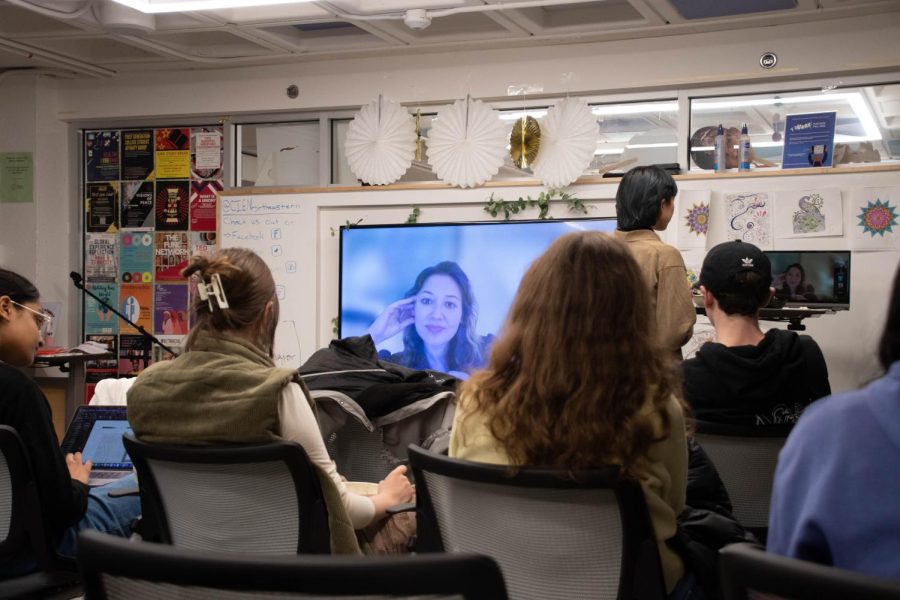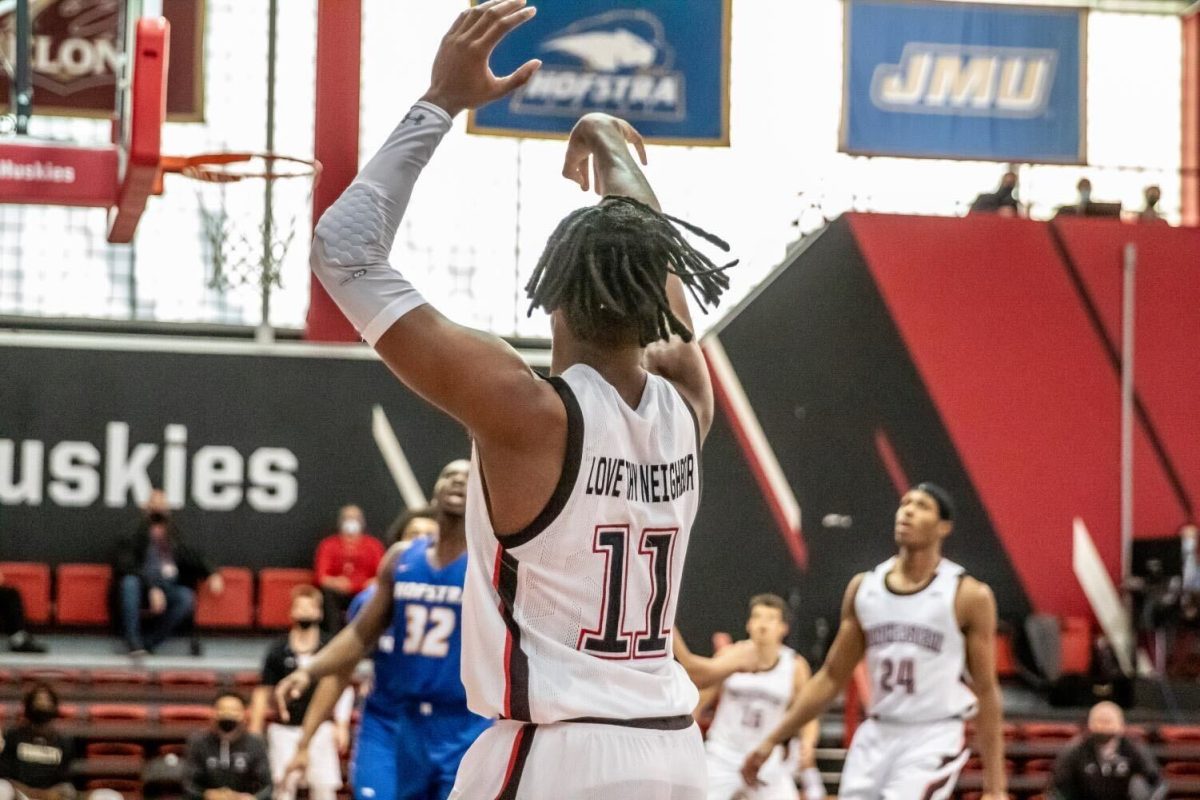Student groups partner with WISP to discuss reproductive justice
Jennifer Dwork, VP of Brand Marketing for WISP, answers audience questions during the joint FSO and NUSHARE panel on Sexual and Reproductive Health.
January 12, 2023
Students spoke with representatives from the reproductive healthcare company Wisp Dec. 1 at an event centered on how the overturning of Roe v. Wade will impact access to reproductive health services. The event was a collaboration between the Feminist Student Organization, or FSO, and Sexual Health Advocacy, Resources, and Education — also known as SHARE.
Dr. Laura Purdy, a family medicine doctor based in Georgia, and Jennifer Dwork, vice president of marketing from New York, represented the company in a virtual meeting with Northeastern students in the Curry Student Center.
Wisp began in 2018 as a company offering delivery of reproductive healthcare and remote consultations with doctors. The company experienced greater demand during COVID lockdowns as more patients sought to avoid getting reproductive healthcare in-person. The company first reached out to SHARE and FSO and offered to give out merchandise and introduce students to Wisp in an effort to gain support and visibility for the company. The two student organizations then collaborated to host the meeting.
Nick Abbatiello, communications manager for FSO and a second-year communications studies and political science combined major, said that in initial correspondences with Wisp, the two student groups had been hoping to address inclusivity of gender identity and sexual orientation in access to reproductive healthcare, as well as the effect the overturning of Roe v. Wade has had on companies such as Wisp.
“We tend to talk a lot about intersectionality and things of that nature,” Abbatiello said. “So we had a few questions about inclusivity in terms of gender, sexuality, access to health care and information. … Another central point that we wanted to bring up was the wake of the Roe decision; how that affects things.”
Throughout the entirety of the meeting, Dwork and Purdy answered questions which ranged from advice on how to get involved in the industry to how to be more inclusive of all people when discussing reproductive healthcare.
In response to a student’s question surrounding the use of gender-inclusive terminology in advertising and addressing patients, Dwork said that Wisp works to be the most inclusive in the field and that the company continually looks to improve.
“Wisp as a company is the absolute leader and is as close as possible to what it looks like when it comes to inclusivity and the language that we use to help our patients understand that the gender expression of the patient [has] nothing to do with what we are treating there medically,” Dwork said. “We’re always afraid of misstepping and saying the wrong thing and not using inclusive language. It can be serious as marketers putting your brand out there if you don’t say the right thing… We are always trying to be better.”
A majority of the student questions highlighted the overturning of Roe v. Wade and the impact it will have on Wisp and its customers’ access to its products and services. Dwork said the overturning of Roe immediately affected the company as demand for emergency contraceptives increased by 3,000% in one day.
While also noting that Wisp launched medical abortions for those who are less than 10 weeks pregnant within the past couple months, Purdy said that Wisp’s ability to meet customer demand has been slowed by the overruling as state legislation has changed. Wisp currently provides telehealth medical abortions in nine states, and is working to provide abortion in all 21 states and Washington, D.C., where abortion is still legal, Purdy said.
“It’s slowed us down and we want to make sure that we’re protecting our patients’ safety and security,” Purdy said. “To really make sure that we’re all buttoned-up, more than we ever were, has slowed us down, but we won’t let it stop us.”
Some pharmacists that fill prescriptions provided by Wisp became reluctant to fulfill healthcare prescriptions following the overruling, Dwork said, out of fear that it would not be compliant with new state regulations. In response, Dwork said that Wisp has been working with distributors to ensure they can dispense products within the law.
“We do everything legally,” Dwork said. “We only operate in states where it’s legal, so you can be rest assured if you’re getting meds through us, you’re not going to get in trouble.”
Nini Yu, coalition coordinator for FSO and a second-year computer science and political science combined major, said that she hoped the meeting would emphasize reproductive justice, particularly in the context of a post-Roe landscape, to clarify and inform misunderstandings in how Roe’s overturning will affect access to reproductive healthcare.
“We’re very interested in how the overturning of Roe v. Wade affected it all because that is a very prevalent societal issue I think that we are facing right now,” Yu said. “The misinformation and misunderstandings, especially within the medical field, [are] so prevalent because these people go to school for eight years to understand this stuff. The typical citizen is not as educated.”
When asked about a potential ban on contraceptive access after Supreme Court Justice Clarence Thomas’ opinion in the case that overturned Roe, Dobbs v. Jackson Women’s Health Organization, Purdy said that she would strongly resist such a ban.
“I felt empowered to do something, and to be an agent for change because as a physician, I do have power that other people don’t have,” Purdy said. “I can write prescriptions; I have a medical license in all 50 states. So I have prescriptive authority, and I’ll be damned — excuse my French — if some legislator tries to tell me that I can’t prescribe birth control anymore.”
Dwork also delved into difficulties surrounding advertising due to gender roles that Dwork said unfairly targets female reproductive healthcare. Purdy mentioned challenges surrounding medical terms such as vagina, female orgasm and medical abortion, which are often suppressed by advertising platforms such as Google.
“[Abortion is] a dirty word, and let’s call it what it is. Abortion care is simply healthcare, like anything else,” Dwork said. “That is at the heart of what we do: we are here to make sexual and reproductive health care more accessible.”
Dwork also referenced a new advertising campaign from Wisp that will be spread across the New York City subway system, featuring different slogans about abortion access and the female orgasm. However, the advertising team has some preemptive concerns for the campaign following the Metropolitan Transportation Authorities’ rejection of an ad from the sexual pleasure company Dame.
“We’re bracing for the MTA to shut us down, and we will use that as a learning opportunity,” Dwork said.
Double standards relating to gender roles are another threat to the campaign, Dwork said, which more heavily target advertisements relating to female sexual health products than their male counterparts.
“The New York City subway is plastered with [erectile dysfunction] ads and male sexual pleasure [ads], and it’s just not fair,” Dwork said. “We’re trying to change it.”
Both Yu and Abbatiello said they were satisfied with the turnout and discussion during the event.
“I think that it’s really important for everyone to have a little more of an understanding about equality within America, especially in terms of gender and women’s rights,” Abbattiello said. “You can really learn a lot from it, and I think that’s what really spurs change.”







